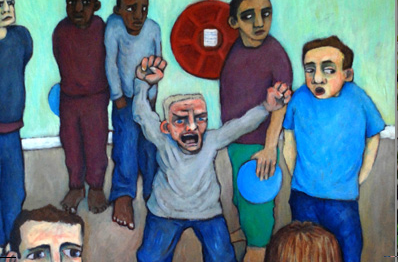On Tuesday morning Lord Chief Justice Lord Thomas announced judges’ right to jail the most serious offenders in England and Wales for the rest of their lives. The ruling by the Court of Appeal has spiked massive controversy as the panel of five judges, headed by the Lord Chief Justice, advocated that whole-life sentences were entirely compatible with the European convention of human rights.
Painting from the Koestler Trust awards (Kvetch – HMP Grendon, Buckinghamshire, Ariane Bankes Outstanding Award for Oil/Acrylic Painting 2008)
- You read Matt Evans on whole life tariffs HERE.
“There is no penalogical reason for a whole life tariff, it is based on revenge, and revenge is no basis for a legal system. As Laws LJ said in Wellington a whole life tariff follows the death penalty logic, a crime so heinous that it can never be atoned for. This reduces a prisoner’s life merely “to his survival: to nothing more than his drawing breath and being kept, no doubt, confined in decent circumstances. That is to pay lip-service to the value of life; not to vouchsafe it.”
Matt Evans
The Daily Mail described the move as “a blow” against the European Court of Human Rights and speculated a “backlash” against the ECHR. Relationships are already tense between UK courts and the ECHR after a statement last year by Justice Secretary Chris Grayling accusing European human rights judges to be persistently “overstepping the mark” and prying “more and more” into areas that should be decided in domestic courts or by MPs in Parliament.
In an article in The Guardian, Joshua Rozenberg described Tuesday’s announcement as English law getting the “upper hand”. He argued the court had dug Grayling out of a hole he seemed “determined to dig for himself”.
In July, the European Court of Human Rights ruled whole-life sentences amounted to a breach of human rights (HERE) in relation to Article 3 of the European Convention on Human Rights (which protects people from inhuman or degrading treatment). As such, being denied any prospect of release was considered a violation of the Human Rights Act. However, the Grand Chamber has made clear, this week, that there is no violation of Article 3 if a prisoner spends the whole of his life in prison if an offender continues to be a risk for the whole of his or her life.
Under the Human Rights Act domestic courts are bound to ‘take into account’ ECHR rulings. However, the Court of Appeal disagreed with Strasbourg that law in England and Wales was restrictive, and does in fact take into account all exceptional circumstances relevant to the release of the prisoner on ‘compassionate grounds’.
In the latest Court of Appeal ruling, Lord Thomas said that the law of England and Wales did provide to an offender ‘hope’ or the ‘possibility’ of release in exceptional circumstances. In relation to an inspection report on life sentenced prisoners published by the Ministry of Justice in September last year, Frances Crook, chief executive of the Howard League for Penal Reform, said that the number of lifers has doubled since the introduction of the ‘defunct’ indeterminate sentence for public protection in 2003.
Tuesday’s hearing saw the court increase a 40-year tariff to a whole-life tariff for murderer Ian McLoughlin, whose trial judge had said he was unable to pass such a sentence. The court found McLoughlin’s previous sentence as “unduly lenient”, and a whole life order has been substituted. Reacting to the judgment, the Attorney General, Dominic Grieve QC MP said: “I am pleased that the Court of Appeal has today confirmed that those who commit the most heinous crimes can be sent to prison for the rest of their lives.”
The Court of Appeal also denied an appeal by murderer Lee Newell that his whole-life order had been “manifestly excessive”.






